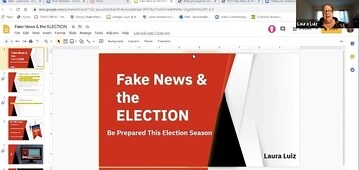BC holds workshop on how to detect fake news

Bakersfield College librarian presents a workshop showcasing fake news and how to avoid it during the current election cycle.
October 24, 2020
Bakersfield College librarian Laura Luiz hosted a workshop on fake news and showed viewers how to deal with it during the election cycle on Wednesday, Oct. 21.
Luiz started off the workshop by explaining five things that are to be expected in this election: to expect voting to require more time and preparation than usual, to expect to fact-check everything you hear (including from people you trust,) to expect the media’s reporting on early results to look different than usual, to expect delays in election results, and to “expect the unexpected.”
After explaining what makes this 2020 election so unique, Luiz explained what fake news really was.
“I am sure you are all hearing about ‘fake news this’ and ‘fake news that,’” Luiz said. “But the true meaning of ‘fake news’ has been lost.”
Fake news can be broken up into two categories: misinformation and disinformation. The key difference between these two is that disinformation is purposefully sent out with hopes of tricking someone into believing it, while misinformation is incorrect information that was spread without intent to mislead.
Fake news has been around for a very long time, but Luiz acknowledged that fake news is so common now because of the internet, and told the audience to become more knowledgeable of biases in news sources by checking them for loaded language, favoring a specific side, or even the direct tone by the writer themselves. It was also encouraged to the audience that news sources should not have memes or gifs on their page, as it is unprofessional.
“Fake news has always been part of the election, but it definitely has become more toxic,” Luiz said.
One other thing that Luiz pointed out was to look out for the use of first-person writing in your news sources. “I” should never be used in a news story unless it is a direct quote or opinion piece. Seeing “I” in a news story means an opinion is being given and is thus not an unbiased source.
Propaganda, despite being around for so long, is still also very prevalent in the 2020 election cycle. According to Luiz, propaganda is still being used on some level to “use your emotions against you,” in various different media such as commercials, advocacy, and quotes you see online.





